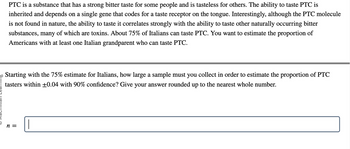PTC is a substance that has a strong bitter taste for some people and is tasteless for others. The ability to taste PTC is inherited and depends on a single gene that codes for a taste receptor on the tongue. Interestingly, although the PTC molecule is not found in nature, the ability to taste it correlates strongly with the ability to taste other naturally occurring bitter substances, many of which are toxins. About 75% of Italians can taste PTC. You want to estimate the proportion of Americans with at least one Italian grandparent who can taste PTC. 20 Starting with the 75% estimate for Italians, how large a sample must you collect in order to estimate the proportion of PTC tasters within +0.04 with 90% confidence? Give your answer rounded up to the nearest whole number. n = 51
PTC is a substance that has a strong bitter taste for some people and is tasteless for others. The ability to taste PTC is inherited and depends on a single gene that codes for a taste receptor on the tongue. Interestingly, although the PTC molecule is not found in nature, the ability to taste it correlates strongly with the ability to taste other naturally occurring bitter substances, many of which are toxins. About 75% of Italians can taste PTC. You want to estimate the proportion of Americans with at least one Italian grandparent who can taste PTC. 20 Starting with the 75% estimate for Italians, how large a sample must you collect in order to estimate the proportion of PTC tasters within +0.04 with 90% confidence? Give your answer rounded up to the nearest whole number. n = 51
MATLAB: An Introduction with Applications
6th Edition
ISBN:9781119256830
Author:Amos Gilat
Publisher:Amos Gilat
Chapter1: Starting With Matlab
Section: Chapter Questions
Problem 1P
Related questions
Question

Transcribed Image Text:PTC is a substance that has a strong bitter taste for some people and is tasteless for others. The ability to taste PTC is
inherited and depends on a single gene that codes for a taste receptor on the tongue. Interestingly, although the PTC molecule
is not found in nature, the ability to taste it correlates strongly with the ability to taste other naturally occurring bitter
substances, many of which are toxins. About 75% of Italians can taste PTC. You want to estimate the proportion of
Americans with at least one Italian grandparent who can taste PTC.
Estimate the sample size required if you made no assumptions about the value of the proportion who could taste PTC. Give your
answer rounded up to the nearest whole number.
n =
68
Incorrect

Transcribed Image Text:PTC is a substance that has a strong bitter taste for some people and is tasteless for others. The ability to taste PTC i
inherited and depends on a single gene that codes for a taste receptor on the tongue. Interestingly, although the PTC molecule
is not found in nature, the ability to taste it correlates strongly with the ability to taste other naturally occurring bitter
substances, many of which are toxins. About 75% of Italians can taste PTC. You want to estimate the proportion of
Americans with at least one Italian grandparent who can taste PTC.
20 Starting with the 75% estimate for Italians, how large a sample must you collect in order to estimate the proportion of PTC
tasters within +0.04 with 90% confidence? Give your answer rounded up to the nearest whole number.
n =
51
Incorrect
Expert Solution
This question has been solved!
Explore an expertly crafted, step-by-step solution for a thorough understanding of key concepts.
This is a popular solution!
Trending now
This is a popular solution!
Step by step
Solved in 2 steps with 4 images

Follow-up Questions
Read through expert solutions to related follow-up questions below.
Follow-up Question
first one n is uncorrect

Transcribed Image Text:PTC is a substance that has a strong bitter taste for some people and is tasteless for others. The ability to taste PTC
inherited and depends on a single gene that codes for a taste receptor on the tongue. Interestingly, although the PTC molecule
is not found in nature, the ability to taste it correlates strongly with the ability to taste other naturally occurring bitter
substances, many of which are toxins. About 75% of Italians can taste PTC. You want to estimate the proportion of
Americans with at least one Italian grandparent who can taste PTC.
20 Starting with the 75% estimate for Italians, how large a sample must you collect in order to estimate the proportion of PTC
tasters within +0.04 with 90% confidence? Give your answer rounded up to the nearest whole number.
n =
1
Solution
Recommended textbooks for you

MATLAB: An Introduction with Applications
Statistics
ISBN:
9781119256830
Author:
Amos Gilat
Publisher:
John Wiley & Sons Inc

Probability and Statistics for Engineering and th…
Statistics
ISBN:
9781305251809
Author:
Jay L. Devore
Publisher:
Cengage Learning

Statistics for The Behavioral Sciences (MindTap C…
Statistics
ISBN:
9781305504912
Author:
Frederick J Gravetter, Larry B. Wallnau
Publisher:
Cengage Learning

MATLAB: An Introduction with Applications
Statistics
ISBN:
9781119256830
Author:
Amos Gilat
Publisher:
John Wiley & Sons Inc

Probability and Statistics for Engineering and th…
Statistics
ISBN:
9781305251809
Author:
Jay L. Devore
Publisher:
Cengage Learning

Statistics for The Behavioral Sciences (MindTap C…
Statistics
ISBN:
9781305504912
Author:
Frederick J Gravetter, Larry B. Wallnau
Publisher:
Cengage Learning

Elementary Statistics: Picturing the World (7th E…
Statistics
ISBN:
9780134683416
Author:
Ron Larson, Betsy Farber
Publisher:
PEARSON

The Basic Practice of Statistics
Statistics
ISBN:
9781319042578
Author:
David S. Moore, William I. Notz, Michael A. Fligner
Publisher:
W. H. Freeman

Introduction to the Practice of Statistics
Statistics
ISBN:
9781319013387
Author:
David S. Moore, George P. McCabe, Bruce A. Craig
Publisher:
W. H. Freeman